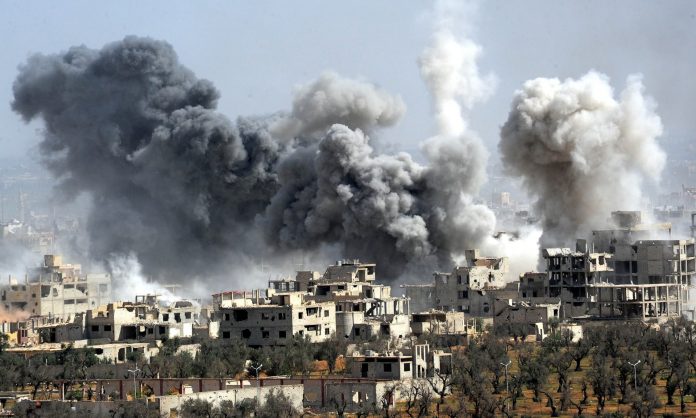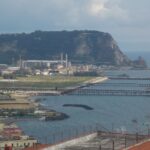James Mattis, the US defense secretary, has said Washington is still looking for evidence on who carried out Saturday’s chemical weapons attack in Damascus and that his main concern about a military response was how to stop it “escalating out of control”.
Donald Trump consulted his top national security advisers on a US response but the White House spokeswoman, Sarah Sanders, said on Thursday “no final decision has been taken”.
According to the New York Times, Mattis appealed at the meeting for more time to gather evidence to prove the Assad regime was responsible for the attack. But the administration appeared determined to deliver on the president’s threat to punish the use of poison gas.
After the White House meeting, Trump called the British prime minister, Theresa May, and the two leaders agreed that “it was vital that the use of chemical weapons did not go unchallenged”.
French president Emmanuel Macron said that his government had “proof” that the government of Bashar al-Assad was responsible for the attack, which is reported to have killed about 50 people and affected hundreds more.
NBC and CNN quoted US officials as saying that blood and urine samples from the victims of Saturday’s attack showed traces of chlorine and a nerve agent, and that US intelligence had other evidence pointing to the regime’s culpability, which would be presented to the president.
Trump himself appeared to walk back an earlier threat of an imminent attack.
On Wednesday, the president tweeted that US missiles “will be coming” and told Russia, which has forces in Syria, to “get ready”. But the next morning, Trump tweeted that he “never said when an attack on Syria would take place”. An attack, the president said “could be very soon or not so soon at all!”
Analysts said the more measured tone suggested that the US and allies were prepared to take longer to ready a more comprehensive attack than the US missile salvo launched last April after a previous poison gas attack, while building pressure on Russia to rein in the regime’s worst atrocities and accept Assad’s departure as part of a Syrian political settlement.
At the UN, the Russian envoy, Vassily Nebenzia, said Russia’s “immediate priority is to avert the danger of war”.
Asked if he was referring to a war between the United States and Russia, Nebenzia told reporters: “We cannot exclude any possibilities unfortunately because we saw messages that are coming from Washington. They were very bellicose.”
Nebenzia added: “The danger of escalation is higher than simply Syria because our military are there. So the situation is very dangerous.”
In testimony to the House armed services committee, Mattis voiced similar concerns, saying “on a strategic level, it’s how do we keep this from escalating out of control, if you get my drift on that.”
Mattis said he believed chemical weapons had been used, but “we are looking for evidence” on who was responsible. Trump has blamed Assad and Russia for backing him.
Macron, who has repeatedly insisted that proven use of chemical weapons in Syria was a “red line” for France, said on Thursday that his government would decide its response “in due course”.
“We have the proof that last week chemical weapons were used – at least chlorine – and that they were used by the Assad regime,” Macron told a TV interviewer.
The French president said one of his aims in Syria was to “remove the regime’s chemical attack capabilities” once all information had been checked.
He he added: “France will in no way allow an escalation or anything that would harm regional stability, but we cannot allow regimes that believe they can act with impunity to violate international law in the worst possible way.”
In London, the cabinet emerged from a discussion on Syria, and put out a statement saying it had agreed “that the Assad regime has a track record of the use of chemical weapons and it is highly likely that the regime is responsible for Saturday’s attack”.
“Cabinet agreed on the need to take action to alleviate humanitarian distress and to deter the further use of chemical weapons by the Assad regime,” the statement from Downing Street said.
Inspectors from the Organisation for the Prohibition of Chemical Weapons (OPCW) were due to arrive in Damascus on Thursday, but they are not due to visit the site of the attack – until Saturday.
Mattis said repeatedly he believed use of chemical weapons was “inexcusable” and required a forceful response.
Asked about a legal justification for punitive strikes, he pointed to the presence of US troops in Syria, who could be vulnerable. He said: “We don’t have to wait until a chemical attack, when [chemical weapons] are be used in the same theatre we are operating in.”
The Kremlin said on Thursday that Russia and the US were currently using a “deconfliction” telephone line for Syria.
Mike Pompeo, the CIA director and Trump’s pick for secretary of state, appeared to affirm at his confirmation hearing reports that about 200 Russian mercenaries were killed in a February clash with US-led forces in Syria. The deconfliction line between the US and Russian militaries was used during that incident.
Nicholas Heras, a fellow at the Center for a New American Security, says that the US and its allies appeared to be preparing a more comprehensive assault on the sinews of Assad powers than the single Tomahawk missile barrage against a Syrian airbase last year.
“If you are going to conduct a campaign that goes beyond the strike in April, you need to plan out who does what,” Heras said. “What are the range of targets and who is responsible for putting a bomb on them? If they are going to do saturation strikes, they have to go after the air defences so that planes can come in to do really specific targeting. The more planes you see in the battlespace the more clear it will be a multiple-day deep targeted campaign.”
Heras said that the deliberative approach is also aimed at ratcheting up pressure on Vladimir Putin, to end his unstinting support of Assad.
“They are trying to give time for Russia to come to the conclusion that the US and France and UK are serious,” he said. “Trump has entered his hard negotiation phase and is personally pissed off with Putin about this. He is asking: what are you doing to put Assad to heel and put him into retirement?”
There were signs that Moscow was preparing for a missile strike. Satellite images released by the Israeli company ImageSat International showed ships had been deployed from Russia’s naval base in the Syrian city of Tartus.
Source https://www.theguardian.com/world/2018/apr/12/syria-deconfliction-hotline-in-use-by-russia-and-us-says-kremlin























































